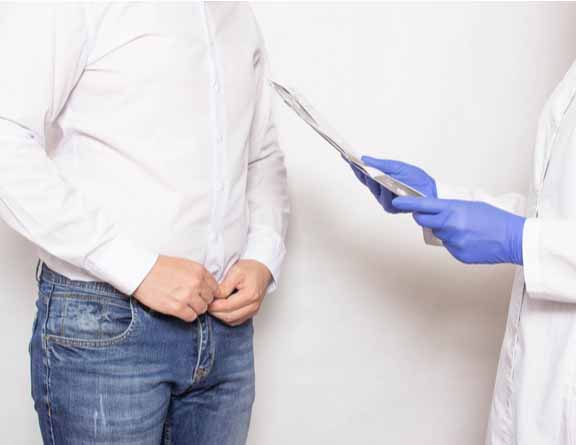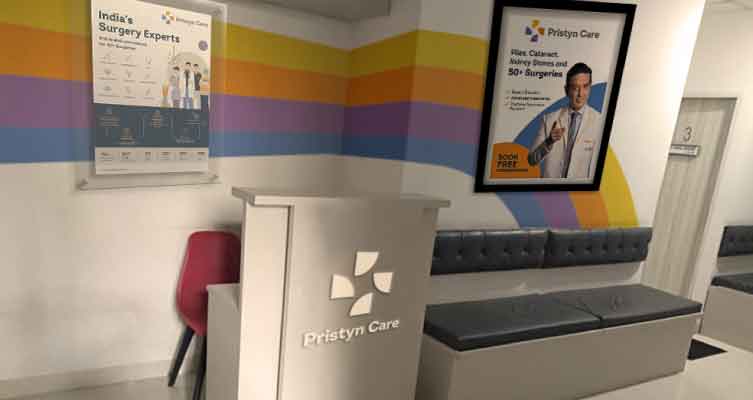
Pune
USFDA Approved Procedures
Minimally invasive. Minimal pain*.
Insurance Paperwork Support
1 Day Procedure


Treatment
Diagnosis
Urologists suggest some diagnostic tests before prostatectomy to figure out the disease/condition, what’s causing it, and how severe it is. In general, urologists suggest the following diagnostic tests before a prostatectomy procedure:
Digital rectal exam (DRE):
DRE is performed to rule out abnormal growths in the rectum while assessing the shape, size, and texture of the prostate gland. The doctor inserts a gloved and lubricated finger into the rectum to perform the diagnosis. It also helps the surgeon figure out the severity of the condition.
Prostate-specific antigen (PSA) test: PSA is considered the most accurate test for prostate pathology. It involves checking the levels of PSA (a protein made by the prostate gland). When the prostate gland is enlarged, the amount of PSA increases, and its concentration indicates the severity of the condition.
Cystoscopy:
In this test, the doctor uses a visual scope to determine the prostate gland’s size. The visual scope is inserted into the urethra to access the bladder for assessment.
Ultrasound:
In an ultrasound, doctors insert a small probe into the rectum to determine the shape and size of the prostate gland. The ultrasound probe produces images of the rectum.
Magnetic resonance imaging (MRI):
MRI scan allows patients to get a clear picture of the prostate gland. It becomes requisite if the doctor suspects aggressive prostate cancer.
Prostate biopsy:
A prostate Biopsy is performed to confirm the presence of prostate cancer. It involves collecting cells from the prostate cells and studying them under a microscope. This is done to determine the cellular structure of the cells and rule out prostate cancer.
Prostatectomy Surgery Preparation
As with any other surgery, preparing for prostatectomy helps in many ways. It brings down the risk of surgery-related complications and also helps patients remain calm during the procedure. So, find below some important tips that you must follow to have a smooth prostatectomy surgery:
Pristyncare%20Clinic.webp)
301, Puskar Icon, Nr. Shukan Cross Road, Nikol - Naroda Rd, above Croma, New India Colony, Nikol, Ahmedabad, Gujarat 382350
Pristyncare%20Clinic.webp)
Shop 1C, 1st Flr, Kunjir Shyama Prestige, Pimple Saudagar, Opposite Vijay Sales, Pune, Maharashtra 411027

Row House 5, Lunkad Gardens, Viman Nagar, Opposite HDFC Bank, Pune, Maharashtra 411014
Pristyncare%20Clinic.webp)
501B, 61/1/1, 61/1/3, 5th Flr, One Place, Kimaya Clinic, Oxford Village, Wanowrie, Near Salunke Vihar Road, Pune, Maharashtra 411040
Delivering Seamless Surgical Experience in India
Your safety is taken care of by thermal screening, social distancing, sanitized clinics and hospital rooms, sterilized surgical equipment and mandatory PPE kits during surgery.
A dedicated Care Coordinator assists you throughout the surgery journey from insurance paperwork, to free commute from home to hospital & back and admission-discharge process at the hospital.
Our surgeons spend a lot of time with you to diagnose your condition. You are assisted in all pre-surgery medical diagnostics. We offer advanced laser and laparoscopic surgical treatment. Our procedures are USFDA approved.
We offer free follow-up consultations and instructions including dietary tips as well as exercises to every patient to ensure they have a smooth recovery to their daily routines.
Complete recovery after prostatectomy can take up to 4 to 6 weeks. Most patients prefer going for a follow-up session after 4 weeks of the surgery. The recovery period, however, can vary from person to person.
Not really. All prostatectomy surgeries are performed under anaesthesia, and patients do not feel any discomfort as such. However, mild discomfort after surgery is normal, and it’s easily manageable.
Prostatectomy is generally suggested to treat localized prostate cancer and other prostate gland issues such as BPH. The surgery becomes necessary when these issues cause severe symptoms that can’t be managed through other treatment methods.
Yes. Most insurance providers offer coverage for prostatectomies. This surgery becomes necessary in cases of cancer and other conditions, and it’s therefore considered a medical necessity. But, there can be a difference in the amount of coverage offered. Therefore, you can connect with your policy provider to get clarity on the insurance coverage of this surgery.
The risks associated with prostatectomy procedures aren’t too many, yet can’t be ignored. Find below some risks associated with prostatectomy:
Pristyn Care is one of the leading players in the surgery sector and provides advanced prostatectomy treatment in Pune. We are associated with the best hospitals in the city that have state-of-the-art infrastructure and curate a hospitable environment for patients to undergo prostatectomy. The surgery is performed by expert surgeons who have extensive experience in carrying out successful prostatectomies and ensuring high success rates. Listed below are some more reasons why you should choose Pristyn Care for prostatectomy:
Laser techniques for performing prostatectomy are becoming the preferred method of treatment, and rightfully so. Laser prostatectomy includes shrinking or extracting excess tissue from the enlarged prostate gland with the help of a laser. This method holds various advantages over traditional prostatectomy techniques, such as:
Types Of Prostatectomy Surgery
Prostatectomy is of several different types. The type of prostatectomy used depends upon the following:
Laser Prostatectomy: Laser prostatectomy is an advanced prostatectomy method with several advantages over conventional techniques. To perform a laser prostatectomy, doctors insert a scope through the urethra, after which a laser is passed through the scope. The laser delivers energy which shrinks the prostate gland and helps remove the excess tissue, relieving the painful symptoms.
This technique poses a lower risk of bleeding, causes minimal discomfort to the patient, doesn’t require a prolonged hospital stay, and has a shorter recovery period.
Robot-assisted Radical Prostatectomy: This is the latest and most advanced prostatectomy method. It involves nerve-sparing methods, which help in preserving sexual potency and continence in the patient and even promote quicker recovery. In this procedure, the surgeon operates from a remote-control console placed at a distance from the operating table. The surgical equipment is handled with the help of two-and and finger control devices. Doctors get a magnified, 3D view of the gland and can carry out the surgery with much more accuracy. They can make smaller incisions without complications.
Open Radical Prostatectomy: This surgery involves the complete removal of the prostate gland and is generally performed in prostate cancer cases. This technique makes incisions in the lower abdomen, above the pelvic bone. The doctor assesses the prostate gland and then discets it to cut its connection with the surrounding nerves and blood vessels. Finally, the gland and its surrounding tissue are completely extracted, and the incisions are closed with sutures.
Open Simple Prostatectomy: Open simple prostatectomy becomes necessary when the prostate is too large in size and can not be treated through less-invasive methods. The surgeon begins by inserting a cystoscope, i.e., a long and flexible viewing scope through the urethra, into the bladder and prostate area. The insertion of a tube follows this called a Foley Catheter through the tip of the penis. This tube helps drain all the urine. Then, the surgeon makes a large incision right below the navel and above the pelvic bone to remove the affected parts of the prostate. In the final step, the surgeon places temporary drainage tubes through the punctures in the skin near the surgery site, which are removed before discharge.
Upon the completion of the surgery, you’ll receive prescription pills and instructions on how to take them. If the doctor feels you’re fit to go back home, you’ll be discharged from the hospital on the same day with some instructions. You might have to visit the hospital one more time for staple removal. Additionally, a urinary catheter will be placed, which you’ll have to carry for 10 days. While complete recovery after surgery can take up to a year, you will be able to resume your activities within a week of the surgery.
In the case of any surgery, after-care plays a significant role in increasing or decreasing the time of recovery. Here are some after-care tips that will help you recover faster after prostatectomy surgery:
Nageena Saha
Recommends
Pristyn Care's prostate enlargement treatment was exceptional. The urologist was knowledgeable and approachable, providing clear explanations about the condition and the available treatment options. They recommended a surgical procedure to address my enlarged prostate, and it was performed with great care. Pristyn Care's attentive care during my recovery was commendable, and I experienced minimal discomfort. Thanks to their support, I am now free from the urinary issues caused by prostate enlargement.